The U.S. Department of Education recently updated its regulations to Title IX of the Education Amendments Act of 1972 for the first time in many years. The final regulations, which require covered institutions to significantly change the way they respond to sexual harassment and misconduct allegations, were subsequently challenged in court by attorneys general (AGs) from 17 states and the District of Columbia following their release.

Recently, the D.C. federal court denied the AGs’ request for a preliminary injunction, paving the way for the long-awaited final regulations to go into effect on August 14 as originally scheduled.
But wait, there’s more. As colleges and universities scramble to implement or revise their sexual harassment policies and grievance procedures to comply with the updated Title IX final regulations, they should be mindful of additional action items likely to require their immediate attention: training and publishing their training materials.
New Training Requirements
The Title IX final regulations require covered institutions to ensure that Title IX coordinators (the individuals designated and authorized by the institution to coordinate its Title IX compliance responsibilities), investigators (of Title IX complaints), decision makers (who oversee the live hearing as part of a Title IX grievance process), and other individuals designated to facilitate an informal resolution process of a Title IX complaint receive training covering the following:
- The updated definition of Title IX sexual harassment;
- The scope of the institution’s education programs and activities;
- How to conduct an investigation and grievance process, including hearings, appeals, and informal resolution processes; and,
- How to serve impartially, including by avoiding prejudgment of the facts at issue, conflicts of interest, and bias.
Decision makers must additionally receive training on any technology to be used as part of the “live hearings” requirement (for the adjudication of complaints as part of the Title IX grievance process), and on issues of relevance when it comes to questions and evidence, including the gatekeeping of irrelevant questions and evidence regarding a complainant’s sexual predisposition or prior sexual behavior.
To be sure, the final regulations require decision makers to be able to determine issues of relevance and explain any decision to exclude a question or certain evidence as not relevant.
Investigators must also receive training on issues of relevance to create the required investigative report that fairly summarizes relevant evidence that will be considered before any live hearing.
Any materials used to train Title IX coordinators, investigators, decision makers, and any person who facilitates an informal resolution process must not rely on sex stereotypes and must promote impartial investigations and adjudications of formal complaints of sexual harassment.
In addition, the materials must be made publicly available on the institution’s website, or if there is no website, available upon request for inspection by members of the public.
Bottom Line
Although there’s no explicit deadline for compliance with the training requirements set forth in the new Title IX regulations, institutions will likely be expected to train Title IX staff in the near future in an effort to avoid a proverbial “train wreck” for complaints asserted under a complex grievance procedure with unprepared staff.
Paige Hoster Good and Adrienne M. Martinez are attorneys with the Oklahoma City, Oklahoma, office of McAfee & Taft. They can be reached at paige.good@mcafeetaft.com and adrienne.martinez@mcafeetaft.com.
